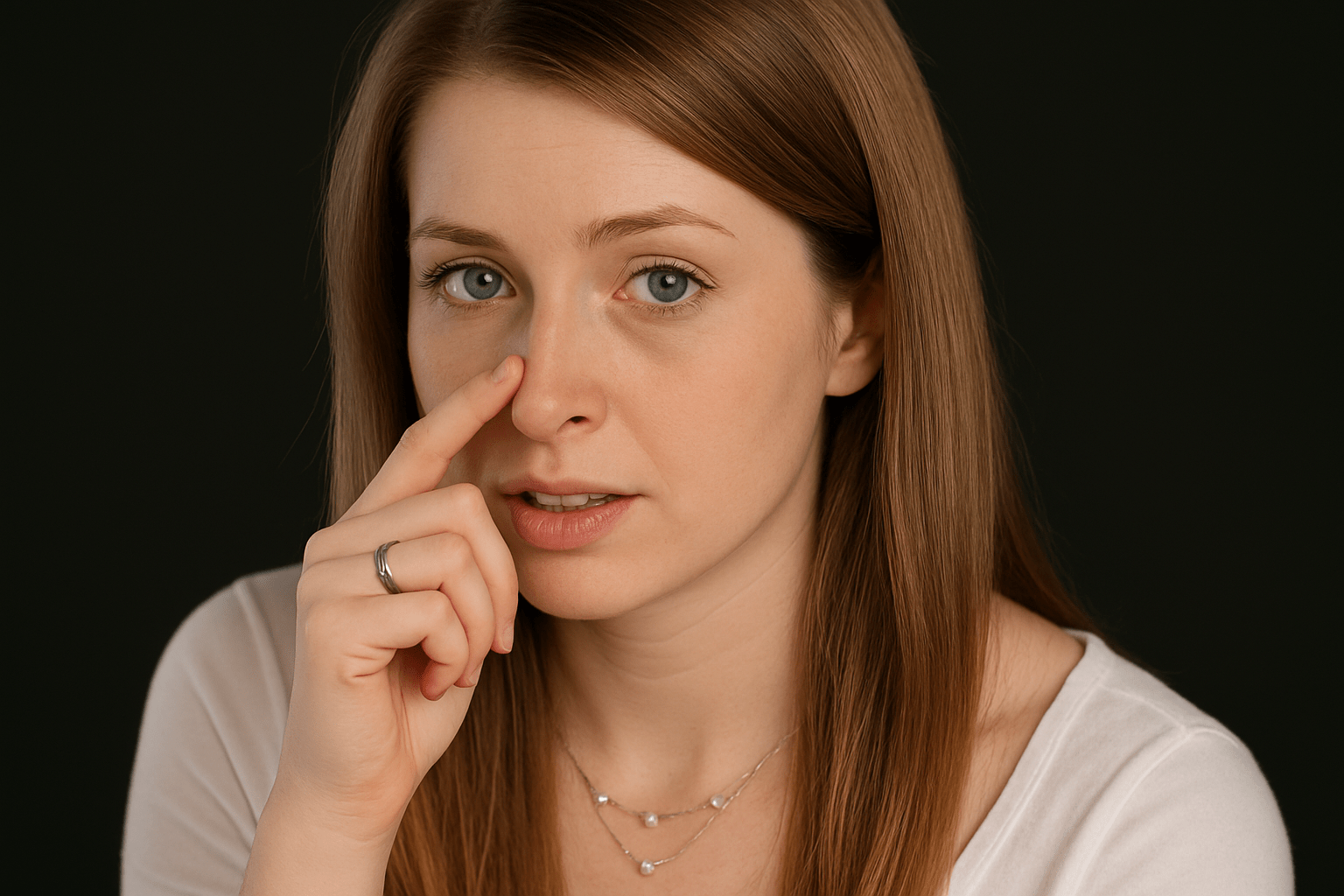nose rubbing in body language
Nose rubbing in Body Language is a subtle yet common body language gesture.
You’ve probably seen it or done it without thinking.
A quick touch. A slow rub. A sudden pinch.
Each movement can say something different.
Let’s break it down clearly.
What Nose Rubbing in Body Language Can Tell You
This gesture often signals rejection, discomfort, or doubt. Not loudly. But it shows up in the background, when someone wants to hold something back or doesn’t agree with what they’re hearing.
It might appear as:
- A quick stroke
- A slow rub
- A pinch at the bridge or tip of the nose
- It can be done during conversations or while alone.
The movement may be light or firm, but it usually happens when emotions start to build. The person may not even realize they’re doing it.

What Can Nose Rubbing in Body Language Mean?
1. Mild Disagreement or Rejection
- You hear something you don’t fully agree with.
- You rub or pinch your nose while listening.
- It’s a subtle sign of internal rejection.
Example:
A coworker suggests an idea in a meeting. You instinctively rub your nose. You may not say it, but you’re not on board.
2. Discomfort With the Topic
- You’re talking about something personal or awkward.
- Your hand goes to your nose.
- It might signal emotional discomfort.
Example:
During a chat about financial troubles, someone touches their nose while speaking. They’re uneasy with the subject.
3. Uncertainty or Hesitation
- You're thinking or about to speak.
- You rub your nose while looking away.
- It shows you're unsure what to say or how to respond.
Example:
A friend asks you a sensitive question. Before replying, you rub your nose. You're weighing your words carefully.
When Do People Rub Their Nose?
Common Meanings in Different Contexts
While Speaking
Someone rubs their nose as they talk. They could be uncomfortable with the topic, or they might be saying something they don’t fully believe.
It can also mean the speaker is self-conscious or unsure. Their words and their feelings might not match.
What to look for:
- Sudden rubbing or pinching mid-sentence
- Avoiding eye contact while rubbing the nose
- Shifting posture after the gesture
Example:
You're explaining a story, and you find yourself touching your nose when you reach a difficult part. You’re not lying, but you’re not fully relaxed either.
While Listening
If someone rubs their nose while you're speaking, that’s a clue. It can point to silent disagreement, skepticism, or internal resistance.
They may not say it out loud. But their body is reacting.
Look at how they’re sitting. Are they leaning back? Looking away? Are their arms crossed?
Put those signs together.
What to look for:
- Nose rubbing paired with crossed arms or leaning back
- Glancing away from the speaker
- Frowning subtly
While Thinking
People often touch their face when thinking, especially the nose. If the person seems stuck, this gesture can signal indecision.
Their brain is working through a problem. Their hand goes to their nose almost automatically as they are rejecting the feeling linked to the problem they are thinking about.
What to look for:
- Prolonged nose rubbing while staring into space
- Pausing speech while touching the nose
- Breathing more heavily after the gesture
While Seeing Something
Say someone rubs their nose after seeing an image, a person, or a scene. That could be a reaction to what they’re seeing.
It doesn’t have to be dramatic. But it can mean discomfort or quiet disapproval.
This can happen in places like a workplace, a family setting, or even while scrolling through a phone.
What to look for:
- Nose rubbing followed by a brief grimace
- Turning the head slightly away
- Blinking more than usual
Before Answering a Question
This one is common.
You ask a question. The person pauses, touches or rubs their nose, then speaks.
It may be a sign they’re filtering their answer.
They're not necessarily lying. But they’re deciding what or how much to say. The gesture appears right before the words come out.
It’s one of those “giveaway” signs in conversations, especially in sensitive or emotional situations.
What to look for:
- Long pause before answering
- Looking down while touching the nose
- A shallow breath or sigh right after the gesture

Nose Rubbing in Body Language Real Life Examples
During a Job Interview
- A candidate rubs their nose while answering a question about past work problems.
- They may feel nervous or unsure about how honest to be.
In a Family Argument
- One person rubs their nose while another is talking.
- It may show silent disagreement or emotional discomfort.
In a Classroom
- A student rubs their nose while a teacher explains something.
- They may not understand but don't want to admit it.
In a Couple’s Conversation
- One partner touches their nose while the other brings up a sensitive topic.
- There might be underlying tension or unresolved feelings.
The gesture shows up in everyday life, if you’re watching for it.
What Should You Pay Attention To?
To make sense of nose rubbing in body language, observe:
- Timing: Does it happen right after a certain word, question, or comment?
- Pattern: Is it a one-time thing or repeated?
- Cluster: Are there other body language signs along with it?
- Baseline: Is this typical for this person, or is it new?
Nose rubbing alone isn’t enough. You need to notice what else is happening around it.
Questions to Ask Yourself When You See It
- Is the person emotionally invested in the topic?
- Do they look comfortable or tense?
- What changed right before they touched their nose?
- Are they saying one thing, but their body says another?
The more you observe, the better you get at spotting small signs that reveal big feelings.
What It’s Not Nose Rubbing in Body Language
Not every nose rub means something deep.
Sometimes it can be allergy. Or the person has a congested nose.
That’s why context matters.
But when this gesture shows up at key emotional moments, paired with hesitation or withdrawal - it often means something more.
How Can You Use This Insight?
- Watch people in meetings or conversations. Do they rub their nose?
- Ask gentle questions if you notice discomfort. “Do you want to talk about something else?”
- Reflect on yourself. Do you rub your nose when stressed or uncertain?
- Use it to improve your awareness - not to judge others.

Key Takeaways Nose Rubbing in Body Language
Nose rubbing in body language can signal:
- Silent disagreement
- Inner conflict
- Emotional discomfort
- Uncertainty
- A filtered or withheld response
You don’t need to call it out. But being aware of it gives you an edge in reading people.
Next time you’re in a conversation, watch for it. What happens right before or after? What does their tone say? What do their eyes do?
Body language isn’t about jumping to conclusions. It’s about noticing more than words.
And gestures like this - small, quiet, automatic - are often where the real story is.

